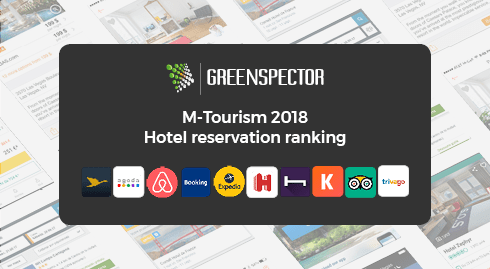The ranking that we conducted within GREENSPECTOR is based on M-Tourism Hotel Reservation applications among the most used in France to compare their consumption in energy and resources according to frequent use scenarios.
Ranking presentation
The mobile channel is an important issue for tourism professionals. More than half of customers use a smartphone or tablet to find information before booking. Tourism holds the third largest market share of e-commerce behind clothing and cultural products.
93% of hotel customers use the internet to search for a hotel and compare prices, moreover Médiamétrie observes that mobile terminals account for 56% of purchases and reservations (e-commerce report: FEVAD study, médiamétrie 2017). If you have never booked a room on one of its reservation platforms, the operation is simple: the application is responsible for searching the best offers of hotels online meeting the criteria of the user, the latter then chooses the most suitable solution for his needs. Since the market has been booming since the last decade with some 20 competing applications on the subject, it has become essential for these platforms to capture and retain customers by offering the best user experience.
If for 71% of mobile users, “slowness” is the first criterion of uninstallation (Mobile Usage Barometer, Open 2018), the practicality of an application is just as much one of the main issues for mobile shopping . These applications must therefore be vigilant about the efficiency and performance of their services by asking the right questions: How to optimize the performance of the application to facilitate the act of purchase? How to reduce the size of the application, the data generated? How to offer a good user experience whatever the environment (inefficient network, smartphone a little old …)? We chose to study 10 applications positioned on the comparison, the hotel reservation and accommodation (s) thus representative of the uses M-tourists French to answer the following question: my battery can she sleep quiet with these m-tourism apps?
Results
Impact of applications on battery life ranking (mAh)

Methodology
We selected 10 applications positioned on the m-tourism hotel reservation.

| Application | Version | Downloads | Playstore grade |
|---|---|---|---|
| Accor Hôtels | 7.1.6 | 1 000 000+ | 4.3 |
| Agoda | 6.37.0 | 10 000 000+ | 4.6 |
| AirBnb | 18.38.1 | 10 000 000+ | 4.5 |
| Booking | 16.1.1 | 100 000 000+ | 4.7 |
| Expedia | 18.39.2 | 10 000 000+ | 4.2 |
| Hôtels.com | 35.0.1.13 | 10 000 000+ | 4.5 |
| HotelsTonight | 18.9.2 | 5 000 000+ | 4.4 |
| Kayak | 64.0 | 10 000 000+ | 4.5 |
| TripAdvisor | 28.2 | 100 000 000+ | 4.4 |
| Trivago | 5.1.6 | 50 000 000+ | 4.2 |
Number of evaluated criteria
- Eco score global: it indicates the level of efficiency of the application, that is to say its respect for the resources of the device (battery, memory, processor) and the quality of its behavior on the network (data volumes, frequency of solicitation).
- Impact on the autonomy of the smartphone: It’s calculated on the basis of the speed of discharge of the battery during the scenario. It’s measured by means of energy sensors of the device.
- Risk of detection of the application as a consumer by the system: Manufacturers like Samsung or Huawei display notifications to users when they detect that an application consumes too much battery. It’s better to avoid this if you want to keep your retention rate.
- Time spent: Here, time is an indicator of the quality of the user journey. A faster route for the most frequent uses will also cause consumption
lower and better quality of user experience (UX).
The different scenarios
4 user scenarios were realized:
- Application connection phase
- Search for a hotel
- Consultation of the “Favorites” or “Voyages” tab
- Consult the opinions of the favorite hotel
To discover the entire study and its in-depth results, download the full version free of charge:

